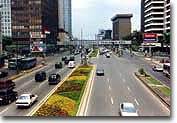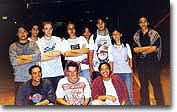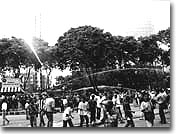|
INDONESIA ENCOUNTERS Five Days in Jakarta
The travel journal of a small group of Milanese university students who went to the Asian archipelago to meet others their own age. A response to an invitation received by e-mail, in order to better understand the situation after the dramatic events in East Timor
BY EMANUELE BOFFI, LUCA FRIGERIO, LUCA DE SIMONI |

We found out where East Timor is by looking it up in an atlas. After reading about it in the newspapers and watching the TV news, we had become curious about what was happening on the island. Slowly we came to know that it is a Catholic country and that for years it has been living in difficult circumstances. To find out a little more, we organized a meeting at the Università Cattolica entitled "East Timor, a Challenge for the West." One thousand five hundred persons listened for an hour and half to Luigi Amicone, editor of the weekly Tempi, Rata Abecassis, a Portuguese journalist for the radio Renacença, and two journalists who happened to be in the Indonesian archipelago during those days: Annabella Gois, correspondent for the Portuguese radio in Dili (capital of Timor), and Johannes Von Dohnany, correspondent for Tempi and Il Giornale in Jakarta (capital of Indonesia). While Annabella described the difficulties of the Timorese people and the massacres that the pro-Indonesian militia were perpetrating at the time around Dili, Johannes was an eyewitness to another situation not as difficult, but no less dramatic.
Jakarta was chaos. The population, led by students, had taken to the streets to protest against a government that is felt to be invasive and violent. It was in fact some of these students, contacted by the German journalist, who decided to write us an e-mail message explaining the reasons for their struggle: "We are fighting for democracy and freedom. We want Suharto, Habibie, Wiranto to be put on trial. We are not afraid to die. Pray for us." After the meeting, a correspondence by e-mail began between us, leading to their invitation for us to come see them. On November 13th there would be a demonstration in memory of three of their friends who died the year before, during the first skirmishes with the government militia. So they wrote us saying that it would be a good thing if we could come to their demonstration. "Where, in Indonesia? What about money? And our exams? Is it safe?" "We've found the money, everything is safe now, and as for exams… we'll study harder when we get back." Our mothers and girlfriends calmed, we set out. The Bishop and the head-hunters After a twenty-hour flight we landed in Jakarta. Waiting for us was Paolo Tognini, an Italian who ended up on the other side of the world in search of oil. "I am a geologist, and the English company for whom I work sent me here because the area is rich in natural resources." But isn't this considered a Third World country? "Yes, all the wealth you can find comes from and returns to the West." The city itself reflects this logic. Beneath the tall skyscrapers of the various international companies are the roadside stands of the Indonesians. You find everything there, from newspapers to cigarettes, from food to children's toys. "Until two years ago Indonesia lived the so-called boom of the South-east Asian countries. All of the West rushed here to make deals. Then the stock market crisis and a sudden impoverishment brought this country to its knees." At every crossroads, entire families beg, children come up to taxi windows with their hand out. Outside the car, the temperature was almost 90º F, with 90% humidity. "It's the monsoon season," Paolo warned us, "you'll soon realize it. It rains every day." Paolo took us to our guest house, which The Archbishop Renzo Fratini, Apostolic Nuncio for Indonesia whom we had contacted, had arranged for us. They were simple rooms, where every evening we fought the mosquitoes, smaller than the ones we have in Italy, but they bite just the same. The Bishop of Borneo Giulio Meguccini, a native of the Marches, welcomed us. "I have been here for twenty five years, spent in the forest next to the head-hunters." And when will you go back to Italy? "By now, this is my homeland. I think I will stay in the forest for the rest of my life." 
The demonstration, and freedom
Our friends attend the Catholic university of Atma Jaya. This was the scene: it is Saturday, but the university seems like a bazaar; about a thousand students wander through the halls, stepping over people sleeping on the ground or playing chess. Some of them climb onto a raised platform, others tune their guitars. "There's a concert tonight," Squall told us-he is one of the students who wrote to us and a sort of leader of the students' movement-"with some typical traditional dances. We've been working on this event for a week. We are asking the government to open an investigation into the three victims of the first "Semanggi Tragedy." What's that? "Semanggi is the name of a crossroads on the way from our university to the Parliament building. About two years ago in all the universities in the city, small hotbeds of protest erupted against the government. Then all the protesting students came together and we started taking to the streets. Marchers set out from the various universities; we from Atma Jaya were the last to join them before heading toward the Parliament building. A year ago soldiers were waiting for us at the crossroads. They came with their tanks all the way up to the university gates." And what did you do? "We fought with our sticks, but we couldn't do very much against their guns." They shot at chest height. The three kids who were killed were twenty years old. "Many others disappeared and still today their families don't know where they are," Squall ended, showing us a picture of one of the three students. "This was a friend of mine." They took us to see a photographic exhibition set up in the atrium of the university. Some fifty photos document the battles of those days: kids hiding behind lecterns to get away from the bullets, fire hoses trained on the crowd, a hospital. "They came to get us even there; we didn't know where to run." Then the image of a huge crowd facing a line of soldiers. "The whole population supported us, first by coming into the streets with us, then by finding us hiding p laces. Unfortunately, often there were people mixed in with the crowd, paid by the government to provoke the soldiers and give them a pretext to shoot." By now it was evening, and after the concert we went out into the street. Hundreds of students, stopping traffic that was strangely quiet, walked along holding torches, carrying three coffins in memory of the victims. Their parents were among the demonstrators. "Freedom, freedom!" they shouted. What is freedom? we asked Squall. "Doing what you want," he replied. But if someone makes you think that what you want is what he lets you do, are you free? Squall wrinkled his brow and said flatly, "No. But why are you asking me this? Don't you live in a free and democratic country?" Yes, but sometimes it seems that no one cares, we told him. Squall has a hard time believing us. On our way back to the guest house, the cry of "freedom!" still rings in our ears. Catholics and Muslims Archpishop Renzo Fratini carries out his duties in the nunciature. His life is an adventure. He has been in Central and South America, Africa, and Pakistan for four years. "I know the experience of your movement because I am from Macerata and years ago I met three girls who were taking part in the pilgrimage to Loreto. I get Traces and was favorably impressed by Father Giussani's words at the meeting with the Pope on May 30, 1998." While we ate lunch, we told him about our impressions of the demonstration the day before. They are brave kids, we told him, but they don't seem to have any guidance. "Just for this reason, in every university there is a chaplain who does pastoral work among the young people," he said. "But their job is very hard, because the students are very diffident toward adults who in some way hold an institutional position. I know for a fact that many students are in contact with him. Certainly, it would be significant if a movement like yours could get started here. I know that you are very attentive to the world of youth." Then the Nuncio went on, "Bear in mind that here the situation of religion is very different from that of Italy. Here the majority of the population is Muslim, but they are tolerant. This is the largest Islamic country in the world; 10% are Christians and another 10% are Hindus. This is a multi-ethnic society and more or less tolerant according to the area. Timor and now Aceh are examples of difficult situations. The Church moves cautiously, but we can say that the coexistence between Catholics and Muslims, at least on the level of young people, is peaceful, especially now that the government is led by a moderate Muslim named Gus Dur. Certainly, strange things happen. I have had to redo my identity card three times." Why? "The Muslims care a great deal about statistics, and even if you declare that you are Catholic, they count you as Muslim." Before saying goodbye, he warned us that "it is necessary to create a series of official contacts both with the embassy and with the university. This fosters a lasting relationship on a more solid basis. In this way, your trip here will not have been simply an adventure for you, but from it can emerge something positive for your movement and for the Church in Indonesia." 
The Ambassador and Capaneo
With the Nuncio's help we succeeded in getting an appointment with the Italian Ambassador, Carlo Marsili. He gave us a good picture of the history and situation of this country. "Indonesia is a country made up of thousands of islands; from the time of Sukarno, the liberator and first dictator of Indonesia, the government's main concern has been not to leave too much freedom to the various islands. In the West we only heard about the situation in Timor, but here revolts take place every day. In Java the concentration of inhabitants per square kilometer is the highest in the world, but the soil is very poor in resources. Thus the government picks up families and moves them to other islands, promising them a house and a piece of land to farm. Naturally a policy like this makes the natives of those places unhappy, because they feel defrauded of their wealth. This factor, connected with more complex ethnical and cultural reasons, unleashes a series of conflicts that turn Indonesia into a powder keg." And what is happening in Aceh? "Aceh is the northern part of the island of Sumatra, which is rich in oil and always in conflict with the central government. The revolt is led by a group of Islamic fundamentalists who persecute the tiny Catholic minority. The Catholics are either expelled from the country or massacred." That evening we went back by the university to see Squall and his friends. Since we had been struck by the constant talk about freedom, we decided to have him read the ten lines in The Religious Sense which talk about Capaneo and the truly religious man. It takes a while to make him understand who Dante was and what he wrote, but in the end Squall asked us if we could leave him a copy of the book. Basketball and mosquitoes The next day we were back at the university. We played basketball; Italy beat Indonesia by the same number of points as the centimeters of difference in height between us and them. They took us into one of their classrooms, where they put out their newspaper called Viaduct. We chatted a while about everything, and we noticed that compared to the first days they seemed less diffident toward us. "Certainly, you have not gone unnoticed; some of our friends thought you were spies." They told us that often the government uses the religion factor to divide the students' movement. Faby confirmed this: "Often they try to pit us against each other. We don't want this. One morning my father asked me, 'Do you know why you can go to the University?' I answered, 'Because I have legs, papa.' 'And do you know why you are able to live?' 'Because I can eat and breathe.' Then my father grabbed a mosquito and asked me, 'Would you be able to make another one just like this?' In that way I understood that there is something bigger than I am. I am Muslim, but I have always gone to Catholic schools, because they are better. I remain a Muslim and I have Catholic friends. What is wrong with that?" We were in a public place and could not talk about politics. "Spies are everywhere," Dimas explained. "There are a lot of them even among the students." So we passed the evening talking about soccer and whisky. We had a bottle with us, and the gift was definitely appreciated. Some of them went home singing. We came home. Before leaving, they heaped on us stickers, a copy of their newspaper, two jackets from their university, pictures of the demonstration, and a bullet they picked up off the ground during the confrontation. "Absolutely, we must see each other again," Squall told us, "now that we are friends. I am reading the book you gave us. It is interesting, even if some sections are hard for me. Can I write you my questions by e-mail?" Certainly. It will be the first e-mail School of Community in history. |